初中英语动词一般过去时及练习
英语一般过去时专项训练100(附答案)
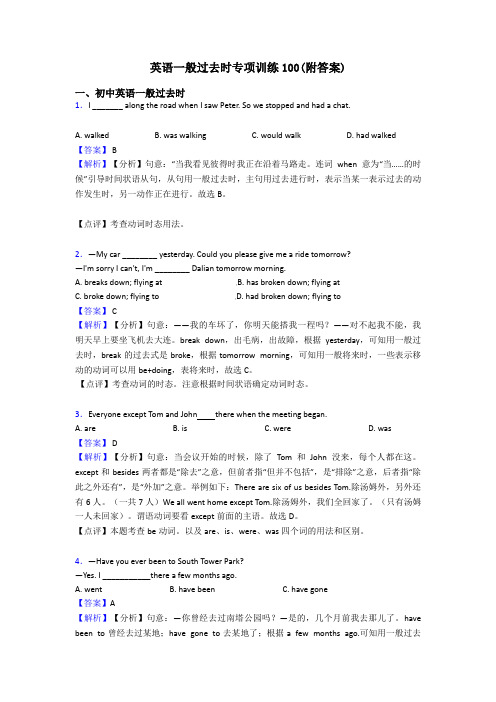
英语一般过去时专项训练100(附答案)一、初中英语一般过去时1.I _______ along the road when I saw Peter. So we stopped and had a chat.A. walkedB. was walkingC. would walkD. had walked【答案】 B【解析】【分析】句意:“当我看见彼得时我正在沿着马路走。
连词when意为“当……的时候”引导时间状语从句,从句用一般过去时,主句用过去进行时,表示当某一表示过去的动作发生时,另一动作正在进行。
故选B。
【点评】考查动词时态用法。
2.—My car ________ yesterday. Could you please give me a ride tomorrow?—I'm sorry I can't, I'm ________ Dalian tomorrow morning.A. breaks down; flying atB. has broken down; flying atC. broke down; flying toD. had broken down; flying to【答案】 C【解析】【分析】句意:——我的车坏了,你明天能搭我一程吗?——对不起我不能,我明天早上要坐飞机去大连。
break down,出毛病,出故障,根据yesterday,可知用一般过去时,break的过去式是broke,根据tomorrow morning,可知用一般将来时,一些表示移动的动词可以用be+doing,表将来时,故选C。
【点评】考查动词的时态。
注意根据时间状语确定动词时态。
3.Everyone except Tom and John there when the meeting began.A. areB. isC. wereD. was【答案】 D【解析】【分析】句意:当会议开始的时候,除了Tom和John没来,每个人都在这。
(完整版)初中一般过去时详细讲解与练习
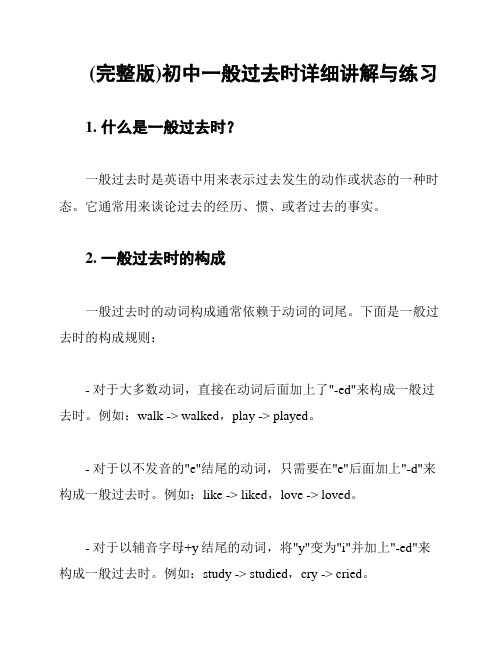
(完整版)初中一般过去时详细讲解与练习1. 什么是一般过去时?一般过去时是英语中用来表示过去发生的动作或状态的一种时态。
它通常用来谈论过去的经历、惯、或者过去的事实。
2. 一般过去时的构成一般过去时的动词构成通常依赖于动词的词尾。
下面是一般过去时的构成规则:- 对于大多数动词,直接在动词后面加上了"-ed"来构成一般过去时。
例如:walk -> walked,play -> played。
- 对于以不发音的"e"结尾的动词,只需要在"e"后面加上"-d"来构成一般过去时。
例如:like -> liked,love -> loved。
- 对于以辅音字母+y结尾的动词,将"y"变为"i"并加上"-ed"来构成一般过去时。
例如:study -> studied,cry -> cried。
- 部分动词的一般过去时需要进行不规则变化。
例如:go -> went,eat -> ate。
3. 一般过去时的用法一般过去时通常用来描述以下情况:- 过去发生的动作:I walked to school yesterday.- 过去的经历:He lived in London for five years.- 过去的事实:She was a teacher in the past.4. 一般过去时的句型练下面是一些练,帮助加深对一般过去时的理解和运用:1. 请用一般过去时填空:Yesterday, I ________ (watch) a movie at home.2. 完成句子:He _____ (visit) his grandparents last summer.3. 改写句子,使用一般过去时:I read a book yesterday. (改为否定句)4. 改写句子,使用一般过去时:They played basketball in the park. (改为疑问句)5. 总结一般过去时是用来表示过去发生的动作或状态的一种时态。
【英语】 中考英语一般过去时专项训练100(附答案)

【英语】中考英语一般过去时专项训练100(附答案)一、初中英语一般过去时1.I _______ along the road when I saw Peter. So we stopped and had a chat.A. walkedB. was walkingC. would walkD. had walked【答案】 B【解析】【分析】句意:“当我看见彼得时我正在沿着马路走。
连词when意为“当……的时候”引导时间状语从句,从句用一般过去时,主句用过去进行时,表示当某一表示过去的动作发生时,另一动作正在进行。
故选B。
【点评】考查动词时态用法。
2.—Have you ever been to South Tower Park?—Yes. I ___________there a few months ago.A. wentB. have beenC. have gone【答案】A【解析】【分析】句意:—你曾经去过南塔公园吗?—是的,几个月前我去那儿了。
have been to曾经去过某地;have gone to去某地了;根据a few months ago.可知用一般过去时,动词用过去式,故选A。
【点评】考查动词时态辨析。
根据时间状语确定合适的动词。
3.He_____ his English teacher when he was sightseeing in Paris.A. has metB. had metC. metD. would meet【答案】 C【解析】【分析】句意:他在巴黎观光时遇到了他的英语老师。
由题干中的语句when he was sightseeing in Paris.提示可知此句要用一般过去时。
meet,遇到,动词;其过去式是met,故选C。
【点评】考查一般过去时的基本用法。
注意不规则动词的过去式的书写。
4.-Have you ever been to Xiamen?-Yes. I _ there in 2013.A. goB. wentC. have gone【答案】 B【解析】【分析】句意:一你去过厦门吗?一是的,我2013年去的。
(英语)英语一般过去时及其解题技巧及练习题(含答案)及解析

(英语)英语一般过去时及其解题技巧及练习题(含答案)及解析一、初中英语一般过去时1.As we all know, the Silk Road _______ China to the west in ancient times.A. connectsB. connectedC. will connectD. is connecting【答案】B【解析】【分析】句意:众所周知,在古代丝绸之路是连接中国和西方的。
In ancient times“在古代”,因此要用一般过去式。
结合句意,故选B。
【点评】考查动词时态。
2.Everyone except Tom and John there when the meeting began.A. areB. isC. wereD. was【答案】 D【解析】【分析】句意:当会议开始的时候,除了Tom和John没来,每个人都在这。
except和besides两者都是“除去”之意,但前者指“但并不包括”,是“排除”之意,后者指“除此之外还有”,是“外加”之意。
举例如下:There are six of us besides Tom.除汤姆外,另外还有6人。
(一共7人)We all went home except Tom.除汤姆外,我们全回家了。
(只有汤姆一人未回家)。
谓语动词要看except前面的主语。
故选D。
【点评】本题考查be动词。
以及are、is、were、was四个词的用法和区别。
3.—Have you ever been to South Tower Park?—Yes. I ___________there a few months ago.A. wentB. have beenC. have gone【答案】A【解析】【分析】句意:—你曾经去过南塔公园吗?—是的,几个月前我去那儿了。
have been to曾经去过某地;have gone to去某地了;根据a few months ago.可知用一般过去时,动词用过去式,故选A。
英语一般过去时题20套(带答案)及解析
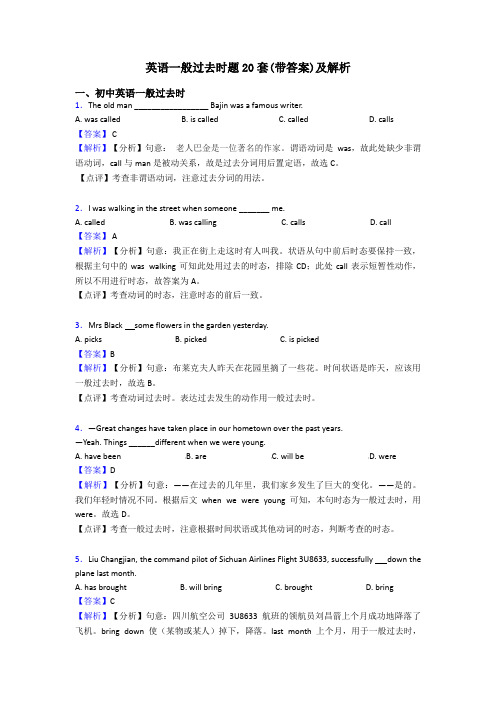
英语一般过去时题20套(带答案)及解析一、初中英语一般过去时1.The old man _________________ Bajin was a famous writer.A. was calledB. is calledC. calledD. calls【答案】 C【解析】【分析】句意:老人巴金是一位著名的作家。
谓语动词是was,故此处缺少非谓语动词,call与man是被动关系,故是过去分词用后置定语,故选C。
【点评】考查非谓语动词,注意过去分词的用法。
2.I was walking in the street when someone _______ me.A. calledB. was callingC. callsD. call【答案】 A【解析】【分析】句意:我正在街上走这时有人叫我。
状语从句中前后时态要保持一致,根据主句中的was walking可知此处用过去的时态,排除CD;此处call表示短暂性动作,所以不用进行时态,故答案为A。
【点评】考查动词的时态,注意时态的前后一致。
3.Mrs Black some flowers in the garden yesterday.A. picksB. pickedC. is picked【答案】B【解析】【分析】句意:布莱克夫人昨天在花园里摘了一些花。
时间状语是昨天,应该用一般过去时,故选B。
【点评】考查动词过去时。
表达过去发生的动作用一般过去时。
4.—Great changes have taken place in our hometown over the past years.—Yeah. Things ______different when we were young.A. have beenB. areC. will beD. were【答案】D【解析】【分析】句意:——在过去的几年里,我们家乡发生了巨大的变化。
——是的。
英语一般过去时专项训练及答案

英语一般过去时专项训练及答案一、初中英语一般过去时1.Mr Zhang and his wife _______to the party last Sunday。
()A. invitedB. was invitedC. were invited【答案】 C【解析】【分析】句意:上周星期天请的张先生和妻子参加晚会。
表示上周星期天发生的过去动作,用一般过去时态;主语Mr Zhang and his wife是谓语动词invite的承受者,用被动语态,主语Mr Zhang and his wife表示复数合义。
故选C。
2.Everyone except Tom and John there when the meeting began.A. areB. isC. wereD. was【答案】 D【解析】【分析】句意:当会议开始的时候,除了Tom和John没来,每个人都在这。
except和besides两者都是“除去”之意,但前者指“但并不包括”,是“排除”之意,后者指“除此之外还有”,是“外加”之意。
举例如下:There are six of us besides Tom.除汤姆外,另外还有6人。
(一共7人)We all went home except Tom.除汤姆外,我们全回家了。
(只有汤姆一人未回家)。
谓语动词要看except前面的主语。
故选D。
【点评】本题考查be动词。
以及are、is、were、was四个词的用法和区别。
3.— Where did you go last weekend?— I to the Great Wall.A. goB. wentC. will goD. have gone【答案】B【解析】【分析】句意:——上个周末你去哪里了?——我去长城了。
A,go一般现在时。
B,went一般过去时C,will go一般将来时。
D,have gone现在完成时。
据时间状语last weekend可知此处用一般过去时,故用动词的过去式went。
初中一般过去时练习题及答案
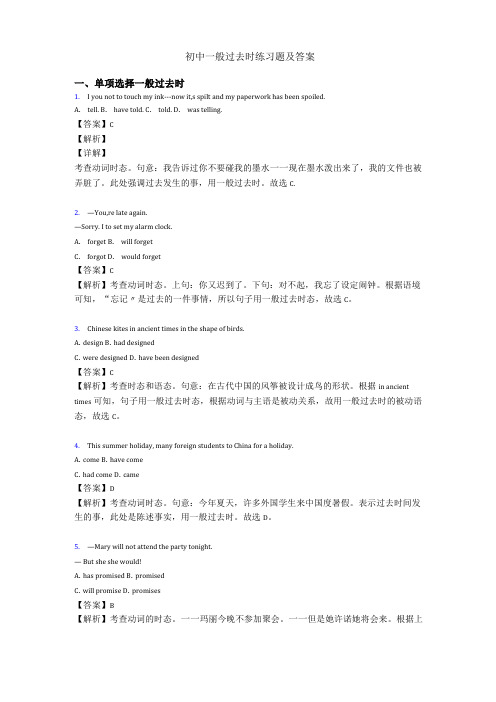
初中一般过去时练习题及答案一、单项选择一般过去时1.I you not to touch my ink---now it,s spilt and my paperwork has been spoiled.A. tell.B. have told.C. told.D. was telling.【答案】C【解析】【详解】考查动词时态。
句意:我告诉过你不要碰我的墨水一一现在墨水泼出来了,我的文件也被弄脏了。
此处强调过去发生的事,用一般过去时。
故选C.2.—You,re late again.—Sorry. I to set my alarm clock.A. forgetB. will forgetC. forgotD. would forget【答案】C【解析】考查动词时态。
上句:你又迟到了。
下句:对不起,我忘了设定闹钟。
根据语境可知,“忘记〃是过去的一件事情,所以句子用一般过去时态,故选C。
3.Chinese kites in ancient times in the shape of birds.A.designB.had designedC.were designedD.have been designed【答案】C【解析】考查时态和语态。
句意:在古代中国的风筝被设计成鸟的形状。
根据in ancient times可知,句子用一般过去时态,根据动词与主语是被动关系,故用一般过去时的被动语态,故选C。
4.This summer holiday, many foreign students to China for a holiday.eB.have comeC.had comeD.came【答案】D【解析】考查动词时态。
句意:今年夏天,许多外国学生来中国度暑假。
表示过去时间发生的事,此处是陈述事实,用一般过去时。
故选D。
5.—Mary will not attend the party tonight.— But she she would!A.has promisedB.promisedC.will promiseD.promises【答案】B【解析】考查动词的时态。
英语一般过去时总结和练习含答案百度文库
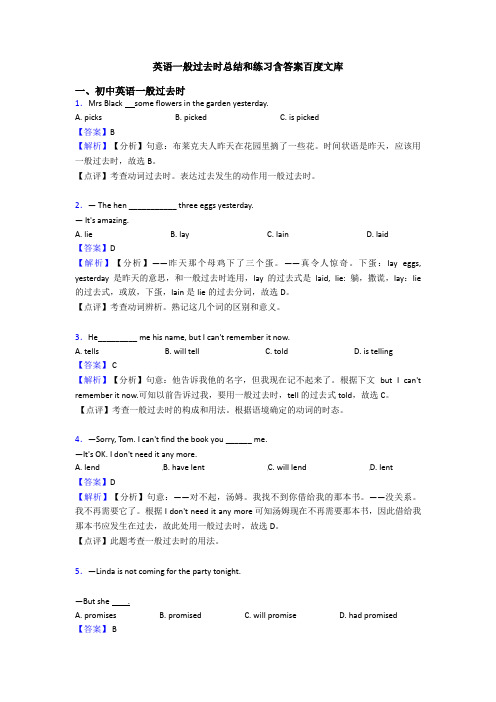
英语一般过去时总结和练习含答案百度文库一、初中英语一般过去时1.Mrs Black some flowers in the garden yesterday.A. picksB. pickedC. is picked【答案】B【解析】【分析】句意:布莱克夫人昨天在花园里摘了一些花。
时间状语是昨天,应该用一般过去时,故选B。
【点评】考查动词过去时。
表达过去发生的动作用一般过去时。
2.— The hen ___________ three eggs yesterday.— It's amazing.A. lieB. layC. lainD. laid【答案】D【解析】【分析】——昨天那个母鸡下了三个蛋。
——真令人惊奇。
下蛋:lay eggs, yesterday是昨天的意思,和一般过去时连用,lay的过去式是laid, lie: 躺,撒谎,lay:lie 的过去式,或放,下蛋,lain是lie的过去分词,故选D。
【点评】考查动词辨析。
熟记这几个词的区别和意义。
3.He_________ me his name, but I can't remember it now.A. tellsB. will tellC. toldD. is telling【答案】 C【解析】【分析】句意:他告诉我他的名字,但我现在记不起来了。
根据下文but I can't remember it now.可知以前告诉过我,要用一般过去时,tell的过去式told,故选C。
【点评】考查一般过去时的构成和用法。
根据语境确定的动词的时态。
4.—Sorry, Tom. I can't find the book you ______ me.—It's OK. I don't need it any more.A. lendB. have lentC. will lendD. lent【答案】D【解析】【分析】句意:——对不起,汤姆。
- 1、下载文档前请自行甄别文档内容的完整性,平台不提供额外的编辑、内容补充、找答案等附加服务。
- 2、"仅部分预览"的文档,不可在线预览部分如存在完整性等问题,可反馈申请退款(可完整预览的文档不适用该条件!)。
- 3、如文档侵犯您的权益,请联系客服反馈,我们会尽快为您处理(人工客服工作时间:9:00-18:30)。
III.英语动词一般过去时一,概述1.一般过去时表示过去某个时间里发生的动作或状态;过去习惯性、经常性的动作、行为反复发生的动作,过去主语所具备的能力和特点。
2.动词的变化1).直接加ed:work—worked look—looked talk--talked visited2).以不发音e结尾的单词,直接加d:live —lived hope—hopeduse—used arrive--arrived practice--practiced3).以辅音字母+y结尾的,变y为i加ed:study—studied carry—carried worry——worried4).以重读闭音节结尾的,双写最后的辅音字母+ed:stop—stopped plan——planned shop--shopped读音:清辅音后读/t/,浊辅音读/d/,在/t/和/d/后读/id/.5). 不规则变化的动词过去式:have---had are---were get---got say---said feel---feltdo/does---did is---was go---went drink--drank 其他详细见课本P.1413.常跟过去时间状语连用yesterday (morning,afternoon,evening) the day before yesterdaylast night (week,Sunday,weekend,month,winter,year,century 世纪)a (two...) year agothis morning/afternoon/eveningwhen引导的状语从句(动词过去时)just now刚才=a moment agothe other day -- a few days ago.几天前at the age of 10 (过去年龄段)in the old days在过去日子里at that time在那时at that moment在那一刻例如:Li Ming did the dishes just now.Last week I bought a new bike.She took the Subway to school this morning.二.句法结构基本结构:主语+谓语(动词过去式)+句子其他成分;1、肯定形式①主语(任何人称)+动词过去式+其他例句:She often came to help us in those days. ②主语+was/were+形容词/名词/介词短语+过去时间;例句:I/he/she was ill yesterday.We/You/they were there this afternoon.My grandpa was dead last year.2、否定形式(注意:was not=wasn’t ,were not=weren’t)①主语+was/were+not;例句:I wasn’t here yesterday.They weren’t there this afternoon.②主语(任何人称)+didn't+行为动词原型+其他即在行为动词前加didn't(=did not),同时还原行为动词例句:I didn't know the schoolmate’s name. We didn’t have sports this morning.3、一般疑问句形式①Did+主语(任何人称)+谓语动词原型+其他?肯定回答:Yes,we/they/you/I/he/she/it+did.否定回答No,we/they/you/I/he/she/it+didn’t例句:Did he wash his clothes a moment ago?Yes,he did. /No,he didn’t.②Was\Were+主语+表语(形容词/名词/介词短语+过去时间)?肯定回答:Yes,he/she/he/I+was或we/they/you+were否定回答:No,he/she/he/I+wasn’t we/they/you+weren’t例句:Was Sally here yesterday? Yes,she was./No,she wasn’t.Were they in the park just now? Yes,they were./No,they weren’t.4.特殊疑问句形式疑问代词+ 一般疑问句语序,如果有时间状语,注意选择对应过去时间. When did you go there?你什么时候去过那的?What did he buy yesterday?他昨天都买什么了?Where were you last night?昨晚你在哪?How did she get to New York last week?上周她是怎么到达纽约的?W hose shoes were they?这些曾经是谁的鞋子?三、口诀一般过去时并不难,过去动作、状态记心间。
动词要用过去式,时间状语句末站。
否定句很简单,didn't 站在动原前,其它部分不要变。
一般疑问句也好变,did放在句子前,主语、动原、其它部分依次站立。
特殊疑问句也简单,疑问词加一般疑问句记心间。
最后一条请注意,动词过去式要牢记!一般过去时相关练习一、写出下列动词的过去式1.am/is ________2.make _______3.go ________4.cut _______5.isn’t _________6. aren’t ________7.spend________8.cook_______9.read ________ 10.clean _______ 11.live _______ 12.study_________二、用适当的词完成下列对话1.— How was your weekend? — It ______ great.— What _______ you ______ last weekend ? — I _______ some homework.2.— What ______ she ______ last weekend? — She _______ to the beach.3.— What _______ they do last weekend? — They ________ to the movies.三、用括号内所给词的适当形式填空1. We _________ (enjoy) ourselves at the party last night.2.Jack ____________ (study) for the English test last Sunday.3._______ you ______ (go) to the Great Wall last year?4. What day ___ ____ (be) it yesterday?5.The old man ____ ___(be)ill and went to see a doctor.6.We ________ (have) a party last night.7.We __________ (visit) the museum and went home.8.— How _______ (be) the students? — They were very friendly.9.They _________(buy) a guitar yesterday.10.Li Ming_________(come) to the park a few days ago.11.Jack _______ _____ (not clean) the classroom yesterday.12.My mother ________________ (not find)her keys yesterday.四、句型转换1. Tom began to learn Chinese last year. (就划线部分提问)________ _______Tom learn Chinese?2.They played football this morning. (改为一般疑问句并作简略回答)—______ they _______ football this morning?—Yes, they _______./No, they _________ .3.They went to Beijing last year. (就划线部分提问)_________ _________ they ________ last year.4.Tom watched TV last night. (改为一般疑问句)_______ Tom _______ TV last night?5.Mary does homework every day. (用just now 改写句子)Mary ________ ____________ _________ ________ .6.She read English last night. (改为否定句)She________ ____________ English last night.五、选择填空( ) 1.She said her brother ____ in Beijing. He ______ to Japan on business last week.A. wasn’t, wentB. hasn’t, wentC. wasn’t, goD. isn’t, went ( ) 2. _____ he ________ a good rest? No, he didn’t.A. Do, hadB. Did, haveC. Did, hadD. Was, had ( ) 3. As soon as he ________, he ______ to his family.A. arrived, writesB. arrived, writtenC. arrived, wroteD. arriveds, write ( ) 4. Mr. Black was late because he _______ his way.A. losingB. loseC. losesD. lost( ) 5. When _________ Lee ________ school this morning?A. did, got toB. did, get toC. did, getD. did, got( ) 6. Will you please say it again? I ________ quite _______ you.A. didn’t, hearB. don’t, heardC. didn’t, heardD. don’t, hear ( ) 7. ______ you ________ at six o’clock yesterday?A. Do ,get upB. Did, get upC. Do, got upD. Did, got up( ) 8.What did you see _________?A. nowB. every dayC. these daysD. just now( ) 9. —What _____ you _______ last week? —I bought a bag.A. did ,buyB. did , boughtC. do, buyD. do, bought( ) 10. —_____ he ____ his lunch? — Yes, he did.A. Does ,hasB. Does, haveC. Did, haveD. Did, had( )11.—Did the thieves _____ into the car? —No, they______.A. fell, didn’tB. fall , didC. jump, didn’tD. jump, did( ) 12. --When did May come back from Hong Kong?--She _ _ from Hong Kong last Friday.A. come backB. comes backC. returned backD. came back ( ) 13. ____ she _____ this dictionary in the bookshop nearby last week?A. Did, buyB. Does, buyC. Did, boughtD. Does, buys( ) 14. Where _____ Uncle Sun yesterday?A. wasB. wereC. didD. does( ) 15. He ______ worried when he heard the news.A. isB. wasC. doesD. did( ) 16. There _____ a telephone call for my brother Steven yesterday?A. isB. areC. wasD. were( ) 17. Liu Fengwei _____ three yuan for the lost library book.A. paidB. payC. spentD. lost( ) 18. He ____ in this school in 1958.A. taughtB. teachC. teachesD. teaching( ) 19. They _____ tired so they stopped ____ a rest.A. are, haveB. were, haveC. were, to haveD. are, having ( ) 20. It was raining hard when he ____ home.A. gotB. getC. getsD. was getting。
